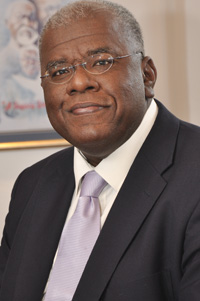Latest News Archive
Please select Category, Year, and then Month to display items
02 January 2025
|
Story Gerda-Marie van Rooyen
|
Photo Supplied
 Leading the research in South Africa is Prof Linus Franke from the Department of Soil, Crop and Climate Sciences.
Leading the research in South Africa is Prof Linus Franke from the Department of Soil, Crop and Climate Sciences.
Scientists are actively pursuing the successful breeding of diploid hybrid potatoes from inbred lines. This is expected to revolutionise potato breeding as it holds the key to rapid genetic progress. It will introduce new varieties for commercialisation through seed. Currently, existing potato variants have a gene that renders self-pollinated seeds infertile.
Prof Linus Franke, an academic in the Department of Soil, Crop and Climate Sciences at the UFS, is leading the research in South Africa. “This technology allows the production of genetically uniform potato seed that is easy to transport and largely disease-free.” He says this differs from conventional breeding whereby only vegetative propagation is possible due to tetraploid varieties in potatoes. It also risks carrying pests and diseases from one generation to the next – leading to the accumulation of pests and diseases with each round of multiplication.
Seed innovation
Prof Franke explains that Solynta BV, a seed company based in the Netherlands that produces potato varieties that can be grown from seed, has included South Africa in their research efforts because it is one of Africa’s largest producers and exporters. Through his academic relationship with Wageningen University and Research, a Dutch institution renowned for its agricultural endeavours and food production, the UFS became involved in researching hybrid potatoes grown from seed.
Diploid seeds containing two sets of chromosomes allow easier gene manipulation to increase predictability and speedier genetic progress. The breeding approach enables the incorporation of tolerance to pests, diseases, abiotic stresses (cold, heat, drought) and other desired genetic traits.
Although Prof Franke is optimistic about this research, he is not blind to disadvantages. “Potato seeds are tiny and have little energy reserves, making it harder to grow potatoes from seed than from tubers.” He says potatoes from seed will take longer to cultivate than tubers, as farmers need to grow plantlets from seeds first, adding six weeks to the growing period. “It is possible that commercial farmers can grow potatoes directly from seed. Alternatively, perhaps more likely, specialised growers will produce tubers of potatoes from seed; these tubers are then sold as seed tubers to other potato farmers, who then continue their normal practices of producing potatoes for the market from tubers.”
Financial benefits
Prof Franke says farmers have reason to get excited. “Seed potatoes will reduce input costs, as varieties with enhanced tolerance to pests and diseases require less pesticides. Planting one hectare of potatoes requires three to four tonnes of potato tubers, but only one 25 g packet of potato seeds.” Since potatoes are a more valuable commodity than maize, this technology might also increase farmers’ income potential.
Vice-Chancellor to receive prestigious lifetime achievement award in the United States
2013-05-23
23 May 2013

- Acceptance Speech
The University of the Free State (UFS) is proud to announce that yet another major international award will be bestowed on the Vice-Chancellor and Rector, Prof Jonathan Jansen.
On 3 June 2013 the Education Africa Lifetime Achievement Award for Africa will be added to the multiple international and local achievements and awards Prof Jansen has received over the past months.
He will receive the award at a gala dinner at the Mandarin Oriental Hotel in New York City, United States. The glamorous event is hosted in collaboration between Education Africa and Brand South Africa. Prof Jansen will join an illustrious list of recipients, including Sir Bob Geldof, Sir Richard Branson and Archbishop Emeritus Desmond Tutu.
“I am deeply humbled by this award which I dedicate to the great teachers of our country, who under difficult conditions make our schools work for children of the poor; they are the real heroes of education," says Prof Jansen.
The Education Africa Lifetime Achievement Award for Africa is a highly regarded recognition on the world stage, awarded to individuals who focus the attention of the global community on the obstacles some of the poorest African nations face.
“He is a pioneering South African educator who is successfully transforming what was once a bastion of apartheid-era segregation and ideology into one of his country’s most inclusive and dynamic institutions of higher learning,” the organisers said in a statement.
As an extra honour to the UFS, one of its Council Members will also receive an award together with Prof Jansen at the ceremony in New York City next month. Ndaba Ntsele, also the Executive Chairman of Pamodzi Gold Limited and President of the South African Black Business Council, will receive the Education Africa Allegiance Award. This award is given to persons for their ‘steadfast support of the organisation [Education Africa] over many years.”
Prof Jansen’s other recent international awards and honours include the Alice and Clifford Spendlove Prize in Social Justice, Diplomacy and Tolerance from the University of California in the US and membership of the Laureate Chapter of the Kappa Delta Pi International Honour Society in Education.
For more information on these as well as the other awards Prof Jansen has recently received, click here.